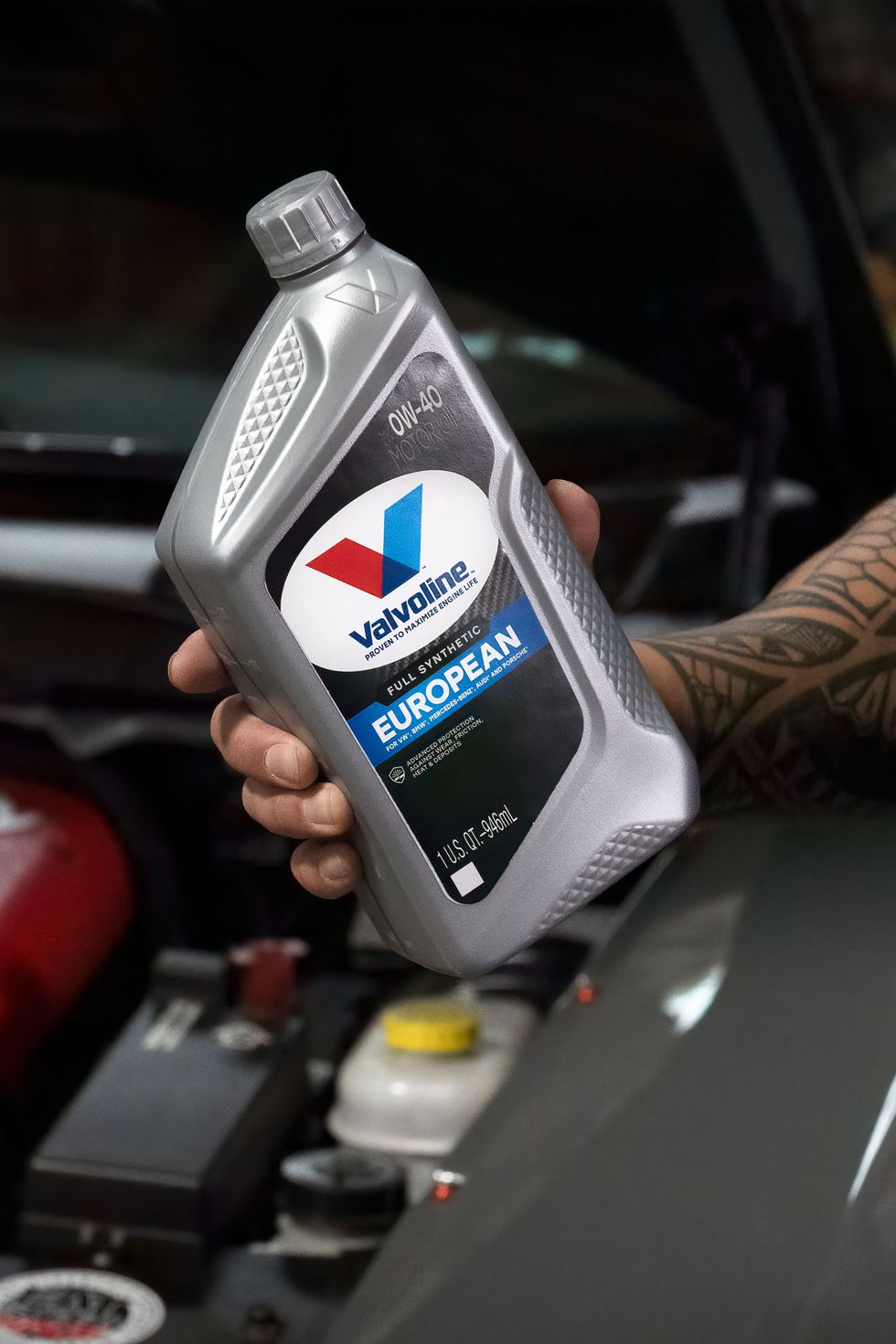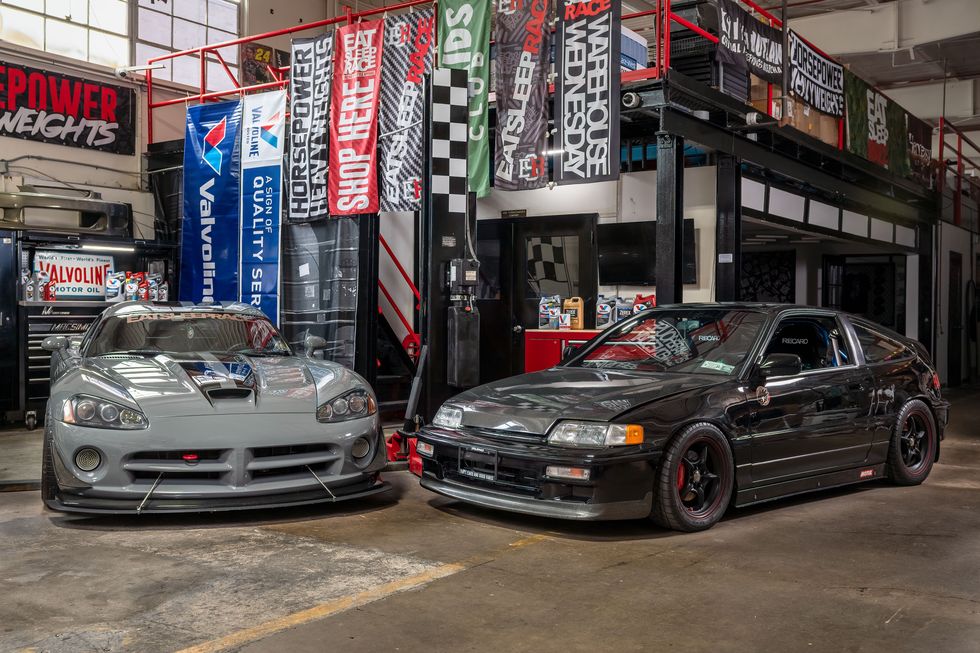
Brian Mabutas is outside on a gray New Jersey afternoon as a light drizzle beads off the faded asphalt. He’s detailing his Dodge Viper, a stealthy, stripe-free example sitting on fat drag radials.
“Do you want the short story or the long story?” Brian asks. The long story, which begins with a boy who grew up near a drag strip, dressed in oversized graphic T-shirts, and taught himself HTML on the family computer, is well worth the time.
Brian is the Founder and Creative Director of Eat Sleep Race—a motorsports apparel brand that’s designed with the flair of hip-hop stylings. He started it 21 years ago while he was a high school senior, simply to merge his passions for cars, fashion, and graphic design into a single creative outlet.
Passing Down the Tools of the Trade
Brian jokes, “I don’t know if this is a lot of other cultures but it just so happens to be in the Filipino culture. My father and a lot of my uncles—they’re all into fixing their own cars. Every house that we went to had a great toolbox.” Inside Brian’s garage, sits a huge, family-approved toolbox and a lift where he can perform oil changes on his Viper and his prized Honda, a 1991 CRX with a full roll cage and carbon hood. On the workbench is Valvoline VR1, the first engine oil designed for motorsports and desired by many enthusiasts to keep their sports cars running at peak performance.
Brian opens the Viper’s hood and puts a bottle of Valvoline on the giant red manifold. His engine bay is as clean as Kyle Larson’s NASCAR paddock. It’s a stunning masterpiece, and one that requires 11 quarts of Valvoline’s European Vehicle Full Synthetic to keep the Viper humming on all 10 cylinders. Because Valvoline is the official motor oil for Hendrick Motorsports, every lesson learned on the track is directly translated into the oil Brian’s using today. For more than 150 years, Valvoline has been proven to maximize engine life. It’s the only motor oil with a dedicated engine lab that allows scientists the freedom to innovate and push the performance envelope.
Fueling the Dream
When Brian visited his extended family they’d often be spending the most time in the garage—fixing their cars and rummaging through fully-stocked toolboxes—a do-it-yourself ethos Brian attributes to his Filipino family. His mother bought him the first version of Photoshop when digital image editing was at its infancy. Brian, not one to use premade templates, promptly taught himself code and was building websites. But these precious, early experiences might never have aligned into a true vision, or a successful global business, had he not tagged along with his older brother Francis.
“My mom wanted him to take me wherever he went,” Brian said.
Francis, then 16, followed her orders. He’d wake up Brian at midnight and make him push his Honda Civic down the driveway and hop in at the end of the road, where they’d duck out and meet up with car enthusiasts in New Jersey’s empty commercial areas.
“There wasn’t a brand that catered to cars and streetwear,” he says. “I thought, why don’t I make shirts that combine the two?”
When The Fast and the Furious came out in 2001, Brian was living the Hollywood fantasy as import-car culture and sanctioned races for heavily-tuned Japanese cars were coming into the limelight. His brother’s friend Leo had a modified Honda Civic that quickly became the only car he wanted to ride inside. He became an honorary member of Leo’s racing team, and soon, the little high schooler without a driver’s license had a bold plan. He’d make the team’s logo and publish a website. Brian whipped up a design and found a screen printer in the Yellow Pages. Now after riding with Leo, he’d pop the trunk at events and sell shirts for $10 a piece.
“I didn’t have a car, so I wanted to feel part of the team,” Brian says. “This was the start of me making apparel.”
Fostering a Growing Car Community
Sunlight is casting a warm glow on the Viper. His car is a fusion of import design and an American chassis, a unique choice Brian uses to erase the “stigma” that has divided car enthusiasts into camps. His Viper brings people together, especially his two-year old son Makoa who loves “Daddy’s race car.” They visit drag strips together, watching the cars rip off quarter-miles with matching Eat Sleep Race-branded earmuffs. He’s now crafting a new line of kids clothing and board books—like The ABCs for Future Race Car Drivers—another void in motorsports culture that Brian wanted to fill with his own vision.
“It’s not just inspiring the next generation of children, it’s also creating a bonding relationship between the parents,” he says. “Every weekend when my dad would be working on a car, changing his oil, my brother and I would be in the garage with him. Now I get to do that with my son.”
This all makes Brian’s plan for the next generation rather simple, and purposeful. He’s passing on his skills and love for cars, clothing, and design to kids who may never know what it was like to roll a manual-transmission Honda down a driveway. He’s inspiring kids, through his self-made business and relentless drive, to consider motorsports and car maintenance as serious careers. But no matter what the automotive landscape becomes, Brian wants his triumphs to become his son’s.
“If there’s one car I’m going to pass on, it’s 100 percent the Viper.”
#Streetwear #Designer #Shifted #Culture #Import #Drag #Racing
Source link







